#Gentleman Boss
Text
The Elegant Mr. Arthur
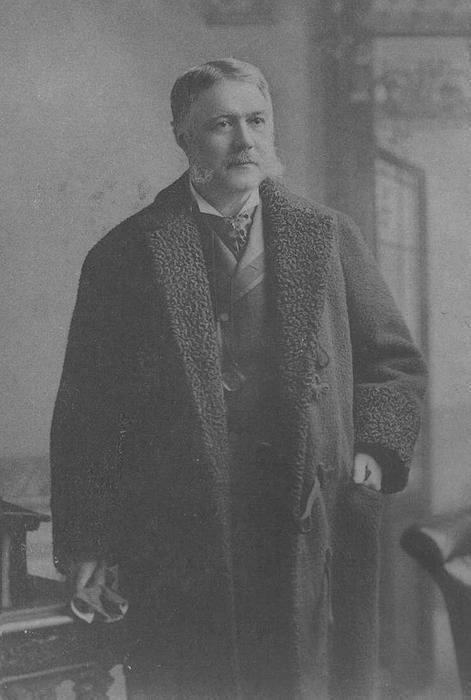
It was about two hours after midnight on September 20, 1881, and not unusual for the resident of 123 Lexington Avenue in New York City to be awake at such a late hour or to have plenty of guests. In fact, he preferred to keep late hours, entertaining friends deep into the night with late-night dinner, drinks, and endless conversation. Yet, on this night, 123 Lexington Avenue was somber and the mood was grave. Just a few hours earlier -- at 11:30 PM -- a messenger knocked on the door of Vice President Chester Alan Arthur's Manhattan brownstone and handed Arthur a telegram. Surrounded by a few friends and colleagues, Arthur read that President James Garfield, just 49 years old and in office for almost exactly 200 days, had died at a beach cottage rough 60 miles away, in Elberon, New Jersey. Turning to his friends in his sitting room, Arthur said, "I hope -- my God, I do hope it is a mistake."
On July 2nd, President Garfield was shot twice and seriously wounded by Charles Guiteau as he walked through the Baltimore & Potomac Railroad Station in Washington, D.C. with Secretary of State James G. Blaine and Secretary of War Robert Todd Lincoln (son of Abraham Lincoln), en route to a speaking engagement at his alma mater, Williams College in Massachusetts. Guiteau was a disgruntled, disturbed, and delusional office-seeker who had been pleading for an appointment as consul to Paris despite an absence of diplomatic or political experience and a complete lack of qualifications. Hounding Garfield throughout the early months of an Administration that had just begun on March 4, 1881, Guiteau's constant harassment of the new President finally resulted in Secretary Blaine ordering Guiteau to never return to the White House again. Guiteau felt that he had been entitled to some office, particularly a high-profile ambassadorship, and was terribly upset that Garfield and his Cabinet members refused to consider his requests. Blaine's order to stay away drove Guiteau to purchase an ivory-handled .44 British Bulldog revolver (specifically chosen because Guiteau felt that particular firearm would look good in a museum) and he began stalking Garfield throughout Washington before finally shooting him in the rail station two days before Independence Day 1881. As police arrested him, Guiteau shouted, "I am a Stalwart of the Stalwarts...Arthur is President now!"
But, Arthur wasn't President; not yet at least. Garfield was a physically robust man and relatively young in comparison to most Presidents. Although one bullet had lodged in Garfield's spine, the other bullet grazed his arm and caused no significant damage. While it appeared that he was gravely immediately following the shooting, Garfield's vital signs soon started to improve and the American people began to get their hopes up about a full recovery. A vigil of sorts was underway as President Garfield convalesced in the White House, and his doctors issued regular bulletins updating his condition. Garfield's doctors also poked and prodded with unsterilized instruments and dirty fingers to attempt to locate the bullet still inside of the President's body. Had they left it alone, Garfield almost certainly would have survived; his wounds were significantly less dangerous than those survived by Ronald Reagan 100 years later. However, the unnecessary poking and prodding resulted in a serious infection that ravaged Garfield's body, weakened his heart, and left the muscular, 215-pound President emaciated and weighing less than 135 pounds. After fighting for his life in the sweltering summer heat of Washington, on September 6th it was finally decided to transport Garfield to a cottage on the Jersey Shore in hopes that he could benefit from the fresh ocean air. Sadly, it was too late. The infections were accompanied by blood poisoning and pneumonia, among other ailments. On September 19th, at 10:35 PM, Garfield suffered a massive heart attack and was pronounced dead. In the 79 days since he had been shot, Garfield had lost over 80 pounds and the 49-year-old President's dark brown hair and beard had turned a ghastly white color. An hour later, the messenger arrived at 123 Lexington Avenue.
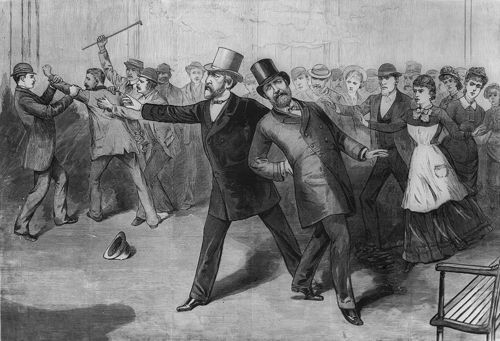
•••
The Vice Presidency was a stretch. Chet Arthur of New York as Vice President? When offered the Republican Vice Presidential nomination by James Garfield in 1880, Chester Arthur was urged by his political mentor, the leader of the Stalwart branch of the Republican Party, Senator Roscoe Conkling of New York, to decline the appointment. Arthur, a man who had never spent a day in Congress or been elected to any office at any level, couldn't turn down such an unexpected opportunity. He accepted the nomination and was elected alongside Garfield in November 1880, but most of the country (rightfully) saw Arthur as the poster boy for a machine politician elevated by the spoils system. The Vice Presidency was certainly a stretch for Chester Arthur, but President of the United States? That was an almost frightening thought to a nation still recovering from Civil War and desperately seeking civil service reform, especially now that a disgruntled office-seeker has assassinated the President. The idea of Arthur as President left a lot of Americans worried -- some because Arthur's political background was as the powerful and somewhat shady Collector of the Port of New York, appointed during the controversial Administration of President Ulysses S. Grant and eventually fired by President Rutherford B. Hayes during a housecleaning of corrupt institutions; and some because James Garfield's murderer had claimed to be a Stalwart and, by his own words, insinuated that Garfield's shooting might be a conspiracy on behalf of Arthur's faction of the divided Republican Party.
Chester Arthur was a creature of the era known as the "Gilded Age" and was the symbolic mascot for the widespread corruption of the 1870's due to his position at the Port of New York. Born in Vermont in 1829, Arthur was the son of a preacher and grew up mostly in upstate New York, graduated from Schenectady's Union College in 1848, briefly taught school was studying law, and was admitted to the bar in 1854. As his law practice grew in the 1850's, Arthur immersed himself in New York Republican politics yet never ran for office. A political appointee to the New York State Militia, he found himself serving during the Civil War and his superb organizational skills led to quick promotions all the way to quartermaster general in 1862, a position which carried the rank of brigadier. As a political appointee to the militia, however, Arthur served at the pleasure of the Governor of New York and was forced to resign in 1862 when a Democratic Governor took office. Returning to New York City, Arthur resumed his law practice and political gamesmanship. More appointments came his way as he supported Republican candidates throughout the state and worked on national campaigns such as President Lincoln's 1864 bid for re-election and Ulysses S. Grant's 1868 Presidential campaign.
In 1871, President Grant appointed Arthur as Collector of customs at the Port of New York, which gave Arthur responsibility for about 75% of the nation's customs duties and was one of the most powerful patronage positions available in the United States government. Arthur used his office to efficiently raise money for Republican campaigns and candidates, supporting President Grant's 1872 re-election campaign by seeking contributions from his employees at the customhouse. In 1876, Arthur championed his political mentor, Roscoe Conkling, for the Republican Presidential nomination, but supported Rutherford B. Hayes in the general election, once again using the employees at the customhouse to help raise money to finance the successful Republican campaign. However, once Hayes was elected, the new President made it clear that he was serious about civil service reform and that meant reforming Arthur's customhouse, too. In 1877, Arthur testified before the Jay Commission, which was formed to investigate charges of corruption and eventually recommended that President Hayes reduce the workforce of the customhouse and eliminate the corrupt elements that had worked there for so long. Due to Arthur's longtime support of the Republican Party, President Hayes offered him an appointment as consul in Paris in order to quietly remove him from the Port of New York. When Arthur refused the appointment, the President fired him and Arthur resumed his law practice in New York City (Hayes intended to replace Arthur with Theodore Roosevelt, Sr. -- father of the future President -- but Conkling felt insulted by Hayes's termination of Arthur and worked to kill Roosevelt's appointment during his Senate confirmation ).
When Arthur headed to the 1880 Republican National Convention at the Interstate Exposition Building in Chicago, it was as a New York delegate supporting the aspirations of former President Ulysses S. Grant who was coming out of retirement to seek an unprecedented third term. However, neither of the front-runners for the nomination -- Grant and Senator James G. Blaine of Maine -- could capture enough votes from delegates to clinch the nomination. After thirty-five ballots, Blaine and another prospective candidate, John Sherman of Ohio, threw their support behind a dark horse candidate -- Ohio Congressman James A. Garfield. On the next ballot, Garfield clinched the nomination and reached out to the opposing wing of the Republican Party for his Vice Presidential choice. The first choice, Levi P. Morton of New York (who would later serve as President Benjamin Harrison's Vice President) declined Garfield's offer, and Arthur -- who had never previously held an elective office -- excitedly accepted, much to the chagrin of his angry political mentor, Roscoe Conkling. Not confident in Garfield's chances for election, Conkling told Arthur, "You should drop it as you would a red hot shot from the forge." Arthur replied, "There is something else to be said," and Conkling asked in disbelief, "What, sir, you think of accepting?" Despite the complaints and anger of Conkling, Arthur told him, "The office of Vice President is a greater honor than I have ever dreamed of attaining. I shall accept. In a calmer moment you will look at this differently."
Following the election, Arthur prepared to settle into the quiet role of Vice President during the 19th Century. The Vice President of the United States has only one real Constitutional responsibility -- to preside over the Senate, and even that responsibility is normally delegated to Senators who rotate as presiding officer almost daily. The powerful or even influential American Vice Presidency is a fairly recent evolution, not even 50 years old. While some Vice Presidents were relied upon for advice or counsel or given larger duties than others, most Vice Presidents were so far removed from the Executive Branch that they were not only kept out of the decision-making process but also kept in the dark about certain information. For example, when President Franklin D. Roosevelt died towards the end of World War II in April 1945 and was succeeded by his Vice President, Harry S. Truman, the new President Truman had to be quickly briefed about the existence of the Manhattan Project to develop atomic weaponry. The first Vice President to have an office in the White House was Walter Mondale and that didn't occur until 1977, so in 1881, a Vice President was expected to preside over the Senate on special occasions, cast a tie-breaking vote when necessary, and be available to take the oath of office if the President happened to die or resign.
Like most 19th Century Vice Presidents, Chester Arthur didn't even spend much time in Washington, and he was returning to his regular home in New York City on July 2, 1881 when he stepped off a steamship with Roscoe Conkling and was told that President Garfield had been shot. In fact, the first message that Arthur received erroneously reported that Garfield was already dead and at the request of Garfield's Cabinet, the stunned Vice President immediately returned to Washington, D.C. to proceed with the next steps necessary for maintaining the continuity of government. When Arthur arrived in Washington, President Garfield's condition had improved and his recovery continued to show signs of promise as the Vice President and the nation prayed for him and held vigil throughout the summer. Shaken by rumors that he and his "Stalwart" wing of the Republican Party conspired to assassinate Garfield, Arthur returned home to New York City, hesitant to invite criticism that his continued presence in Washington was merely an eager deathwatch so that he could grab power.
Garfield clung to life for eighty excruciating days with doctors probing him in an effort to remove the bullet in his body, causing infections and leaving the President suffering from blood poisoning which led him to hallucinate at times. The Navy helped rig together an early form of air conditioning in Garfield's White House sickroom in order to give him relief from Washington's stifling summer conditions. When Garfield was taken by train to New Jersey in early-September, it was clear to many that the long vigil was nearly over. More infections set in, along with pneumonia and painful spasms of angina. When the messenger arrived at 123 Lexington Avenue just before midnight on September 20, 1881 to inform Arthur that President Garfield had died just 60 miles away, the new President wasn't surprised, but he also wasn't quite prepared. The nation worried about the lifetime political operative stepping into the position vacated by the promising President assassinated before he could enact the civil service reforms promised in his Inaugural Address. What would Arthur -- the quintessential patronage politician -- do as President? Nobody knew, but Chester Alan Arthur had an idea.
•••
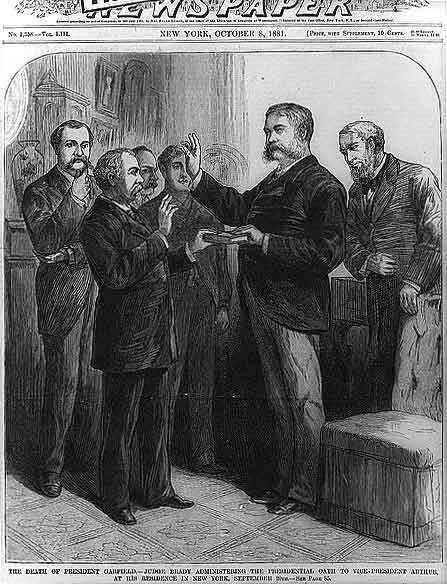
It was fitting that Arthur was surrounded by friends when he took the oath of office at his home in Manhattan at 2:15 AM on September 20, 1881. Arthur's beautiful wife, Nell, died of pneumonia in January 1880 and he was inconsolable for months, regretting for the rest of the life the fact that she never saw his election as Vice President or ascendancy to the Presidency. People who knew Arthur stated that he clearly never fully recovered from her death, and that as a "deeply emotional...romantic person," it was no surprise that he ordered that fresh flowers were placed before her portrait in the White House every day while he was President.
Chester Arthur had a lot of friends. That's what happens when you control as many patronage positions as Arthur controlled for as long as Arthur controlled them. But it wasn't just his political position that gained him friends. Arthur was a great storyteller, a man who loved to hunt and fish, kind, easy-going, charming, graceful, and smooth. During his life he was nicknamed "Elegant Arthur" and is considered one of the most stylish of Presidents. Photographs of Presidents from the 19th Century show us men no different than statues. They dressed the same, they looked the same, and when portrayed in the black and white photos of the time, we feel no differently when we see their pictures than when we see a slab of marble carved in their image. Arthur leaps out of his photographs, however. He was a very large man for his era, standing 6'2" and weighing around 220 pounds during his Presidency. Large muttonchops connected to a bushy mustache and his close-cropped, wavy brown hair seemed to pull back his forehead and place more emphasis on expressive black eyes that easily reflected his moods. While it seems that most Presidents of the 19th Century wore the same boring black suit and black tie like a uniform, Arthur's ties are patterned, his jewelry is visible, collars are crisp, handkerchiefs are folded creatively, and his lapels shine as if they were polished along with his shoes. We see photographs of Arthur in fashionable overcoats, a wide variety of hats, and he employed a personal valet who helped the President change clothes for every occasion and multiple times a day -- he was said to have over 80 pairs of pants.
Most apparent of all is that Arthur was a gentleman -- an interesting man with superb social skills and fastidious manners. Even as one of the top operatives in New York's Republican political machine of the corrupt 1870's, he was nicknamed the "Gentleman Boss." As President, he brought entertainment back to the White House -- something that had been missing on a large scale since before the Civil War twenty years earlier. One of his recent predecessors, Rutherford B. Hayes, was one of the few critics of this development, stating that there was "nothing like it before in the Executive Mansion -- liquor, snobbery, and worse." Arthur also redecorated the White House, hiring Louis Comfort Tiffany to help with the design. To help raise money for the redecoration, Arthur basically held a White House yard sale. On the lawn of the mansion, twenty-four wagons full of history (including a pair of Abraham Lincoln's pants that were left behind in a closet) were sold to citizens. To some, the items were priceless; to President Arthur, they were ugly and a man like Chester Arthur did not live in an ugly home. Several weeks after Garfield died, Arthur got his first look at his new home and quickly stated, "I will not live in a house like this." He didn't end up moving into the White House until three months into his Presidency.
•••
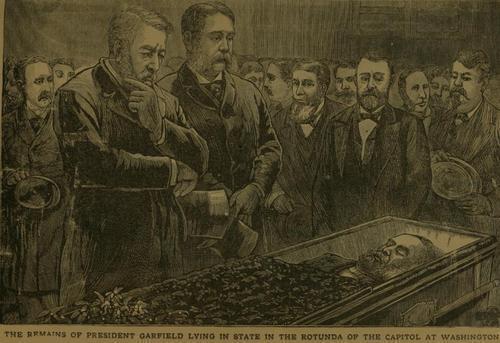
After taking the oath of office at home in Manhattan in the early hours of September 20, 1881, now-President Arthur proceeded to Washington, D.C., stopping in Long Branch, New Jersey to pay respects to the late President Garfield and his grieving family. Once Arthur succeeded to the Presidency upon Garfield's death, there was no Vice President, no president pro tempore of the Senate, and no Speaker of the House because Congress had not elected its leadership yet, thus, there was no Constitutional line of succession. If something had happened to Arthur at that moment, the United States would have faced an unprecedented Constitutional crisis. As his first act as President, Arthur immediately called the Senate into session in order to select their leadership positions and place someone in the line of succession. Upon arriving in Washington, Attorney General Wayne MacVeagh suggested that Arthur take a second oath of office and he did so at the U.S. Capitol on September 22nd in the presence of Garfield's Cabinet, members of Congress, Supreme Court Justices, and former Presidents Grant and Hayes.
Americans worried about the former machine politician's integrity were transformed quickly as Chester Arthur underwent somewhat of a transformation himself. Widely considered a lapdog of New York's Roscoe Conkling, Arthur broke ranks with the party boss and pushed for the same civil service reform championed by James Garfield prior to the assassination. Arthur's former associates in the New York Republican Party were disappointed when he declined their requests for political favors. One former colleague sadly reported, "He isn't 'Chet' Arthur anymore. He's the President." Arthur found that the transformation was almost automatic and out of his control, noting that "Since I came here I have learned that Chester A. Arthur is one man and the President of the United States is another." His old benefactor, Conkling, was one critic of the new President, complaining "I have but one annoyance with the Administration of President Arthur and that is, in contrast with it, the Administration of Hayes becomes respectable, if not heroic." Arthur signed the Pendleton Act in 1883 which created a modern civil service system and eliminated the spoils system that had long dominated American politics. The reform, which Conkling called "snivel service" was the final break between the longtime friends and colleagues.
To the American people, the great surprise of the Arthur Administration was the fact that it was clean, honest, and efficient. Arthur helped lift the gloomy moods that had shadowed Washington through the Civil War, Lincoln's assassination, Andrew Johnson's Impeachment, Reconstruction, the corruption of the Gilded Age, and Garfield's assassination. His popularity rose throughout his term and most critics focused on his lavish entertainment or the fact that he was notoriously late for meetings and seemed bored or lethargic at times. He often procrastinated -- as a White House clerk once said, "President Arthur never did today what he could put off until tomorrow." Still, most Americans were happy with President Arthur and echoed the thoughts of Mark Twain who said, "I am but one in 55 million; still, in the opinion of those one-fifty-five-millionth of the country's population, it would be hard to better President Arthur's Administration."
He was bored, though. President Arthur didn't like being President. He enjoyed the entertaining dinners that he could throw and loved public events or ceremonies that allowed him to meet the people of the United States, but the desk work was tedious and he wasn't interested in policy. Arthur stayed up late and seemed to vacation often, which perplexed many people because it was said that he was constantly exhausted. What they didn't know was that from almost the time he became President, Chester Arthur was dying. In 1882, he was diagnosed with Bright's disease, a fatal kidney ailment at the time. Despite reports that he was suffering from the disease, Arthur hid it from the public, desperately protecting his privacy, as always. Arthur's distaste for the Presidency probably stemmed in part from depression triggered by the Bright's disease. At times, Arthur suffered from debilitating illness and it was always covered with a story about the President catching a cold during a fishing trip or spending too much time in the sun while hunting. In a letter to his son Alan in 1883, the President confided, "I have been so ill that I have hardly been able to dispose of the...business before me."
Despite his popularity, Republican leaders opposed Arthur's nomination as President in his own right in 1884. The man who opposed it most, however, was the President himself, who stated "I do not want to be re-elected." Not only was he disinterested in a second term, but he knew very well that there was a possibility he might not even survive to the end of his current term. He did, and after attending the inauguration of his successor, Grover Cleveland, on March 4, 1885, Arthur returned home to New York City where his health rapidly declined. The former President was aware that he was dying and made plans for a relatively quiet retirement, deciding to practice law, but doing very little work due to his health. When asked about his future, Arthur said, "There doesn't seem anything for an ex-President to do but to go out in the country and raise big pumpkins." On November 16, 1886, Arthur suffered a stroke that paralyzed his left side. Gravely ill, he called his son to his bedside the day before his death and had all of his public and private papers stuffed into trash cans and burned. On November 18, 1886, the 57-year-old former President died in the same place he became President just five years earlier, 123 Lexington Avenue in New York City. After a quiet funeral at the Church of Heavenly Rest on Fifth Avenue in New York, Arthur's remains were buried next to his beloved wife at Rural Cemetery in Albany, New York.
•••
When President Arthur had many of his personal papers burned prior to his death, he eliminated one of the best sources of information for future historians. With a thin resume and a fairly uneventful Presidency, there wasn't much public information about his career, either. This leaves us with very little to remember Chester Alan Arthur by. Research on his life -- particularly his personal life -- is difficult, and Arthur would have appreciated that. During his Presidency, leaders of the temperance movement called on Arthur and urged him to follow the non-alcoholic lifestyle led by President Hayes and his teetotaler wife, who was known as "Lemonade Lucy."
Arthur's response: "Madam, I may be President of the United States, but my private life is nobody's damn business."
And so it isn't.
#History#Presidents#Chester Arthur#Chester A. Arthur#Chester Alan Arthur#President Arthur#Arthur Administration#Presidential History#The Elegant Mr. Arthur#James A. Garfield#President Garfield#Assassination of James Garfield#Garfield Assassination#Charles Guiteau#Inauguration of Chester Arthur#Presidential Assassinations#Presidential Succession#Roscoe Conkling#Gilded Age#Civil Service Reform#Pendleton Act#1880 Election#1884 Election#Politics#Political History#Gentleman Boss#Presidential Personalities#Presidency#Vice Presidents#Vice President Arthur
26 notes
·
View notes
Text
They r consuming my thoughts
#ignore the text at the 2nd to last clip thats just capcut being capcut#helluva boss#hellaverse#fizzarozzie#fizzmodeus#ozzarolli#fizzarolli#asmodeus#ozzie#mammon's magnificent musical mid-season special (ft. Fizzarolli)#i put the scene where he said lust isnt about force when taylor said hes a gentleman#consent king ozzie
346 notes
·
View notes
Text
am I the captain of this ship? no. but I am the overeager cabin boy who will be making this ship my entire personality for the foreseeable future.
#a gentleman's guide to love and murder#gglam#phoebe x sibella x monty#the mystery of edwin drood#rosa bud x helena landless#stolitz#helluva boss#bispearl#steven universe#hanamusa#hanamusashipping#phaesporiashipping#surveyshipping#pokemon#janaya#the dragon prince#raeda#lumity#huntlow#the owl house#perfectdolls#ride the cyclone#anne x ann#anne lister x ann walker#gentleman jack#also yes this is kind of a reference to#treasure island#specifically the play adaptation by bryony lavery#it was my school's fall play and I did in fact get emotionally attached to androgynous jim hawkins
132 notes
·
View notes
Text
I want everyone to be obsessed with this show, to lose their minds for it and go f*ckin crazy. Just like Freddie did in the chicken scene. Everyone should unfasten their seatbelts for this ride and just lose themselves and forget everything around. Amazing creativity and comic absurd I haven’t seen in a long time.

#the gentlemen (2024)#netflix#tv show#tv series#the gentlemen#the gentleman netflix#Netflix uk#guy ritchie#theo james#otp#ship#mafia#gangster#mafia boss#girlboss#kaya scodelario#writers on tumblr
74 notes
·
View notes
Text
HOW HAVE I NEVER NOTICED THIS
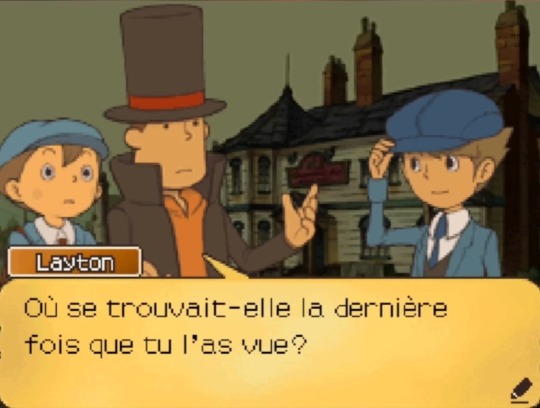
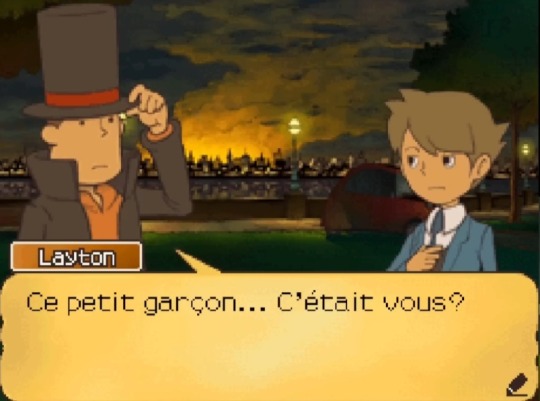
LAYTON USES TU FOR FUTURE LUKE BUT SWITCHES TO VOUS THE SECOND CLIVE'S IDENTITY IS REVEALED.
Tu and vous both mean you but Tu implies closeness : in the entirety of Unwound Future, Layton only ever uses Tu with Flora, the Lukes and Claire
#I'm shaking crying throwing up#WHY WOULD YOU DO THIS TO ME.#He immediately uses tu for Future Luke which is A LOT#In real life we often stumble trying to know which one to use because vous is distance but also respect like for a boss or teacher#(Everyone except Claire uses vous for Layton because he's a highly educated adult and a gentleman)#Layton must really appreciate and trust Luke. He immediately went 'Oh that's a Luke of course he's a close one'#And it makes sense that he would discard the tu when he finds out that nope this is a total stranger manipulating us all#But also normal people would go from tu (affectionate) to tu (derogatory). Of course Layton doesn't as a gentleman but. Ouch#And he never goes back to tu not even after finding out Clive is the orphan he saved#I'm crying why are you doing that to me. It's so subtle I had NEVER noticed but it's there#Maybe the vous will go back to respect or pleasant distance one day but Clive isn't deserving of a tu. He's not Luke. He's a stranger#I HAVE to do a complete pronoun analysis one day. I've talked about it here and there but I need to do a big analysis#Professeur layton et le destin perdu#Professeur layton#hershel layton#clive dove#Been posting a lot of angst lately oops#Professor layton and the unwound Future#Professor layton and the lost future#Unwound Future spoilers#Lost Future spoilers
123 notes
·
View notes
Text
I think I just wrote a parody with a target audience of about 2 people.
1) Me
2)Bryce Pinkham
I am waiting with this crystal in my pocket,
Waiting for my monthly dose of cock
Who I'm afraid might misinterpret all the things I have to say.
If I hadn't snared him in the first place
In a rotten deal that's blown up in my face
I could avoid this, but I'd never known that I was gay.
So,
I am waiting with this crystal in my pocket
One eye on the moon and one eye on the clock.
He'd better show up soon before I lose my nerve and run!
If I only knew if he was going to stay,
Or completely break my heart then turn and run away.
Why did I ever think adult relationships
Would be all fun?
*Blitzo Crashing in the Door Noises*
All of this is much more difficult than I had thought.
Points to anyone who gets it. Gazillion points if you're on a social media that isn't Tumblr and get him to actually sing it before Full Moon comes out, lol.
#helluva boss#gentleman's guide to love and murder#bryce pinkham#stolas#blitzø#helluva blitzo#helluva stolas#vivziepop#stolitz#stolitzo#monty navarro#blitzo#full moon
21 notes
·
View notes
Text
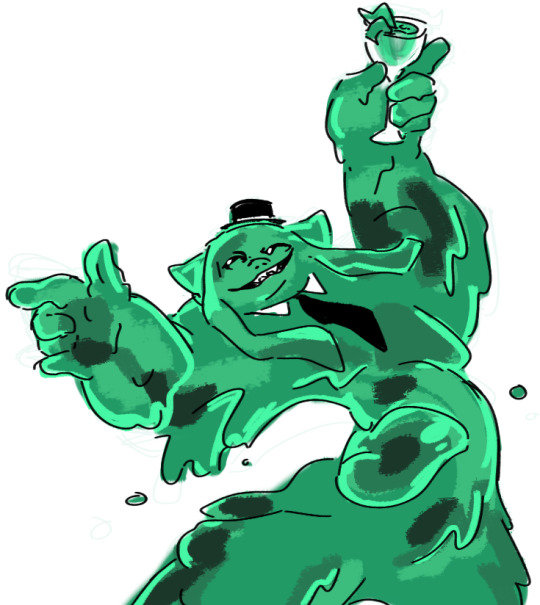
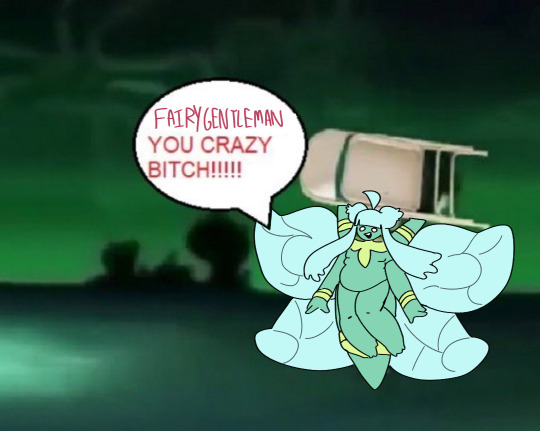
fairy gentleman fans how we feeling about the fight (i am speaking to an empty audience)
fairy festival fans how we feeling in general (i am still speaking to an empty audience. for the love of god please help me
#does the joke get across in the first image?#the joke is geddan if it doesnt. his evade(?) animation reminds me of geddan#and i guess this is kinda canto 4 spoilers because its based on. you know#an abno boss thats only existed for like a day#so like yeag#limbus company#limbus company spoilers#canto iv spoilers#canto 4 spoilers#<- kinda ????????#fairy gentleman#fairy festival#also wtf fairy gentleman is a teth????????????? What is with me and teths#taton's art
108 notes
·
View notes
Text

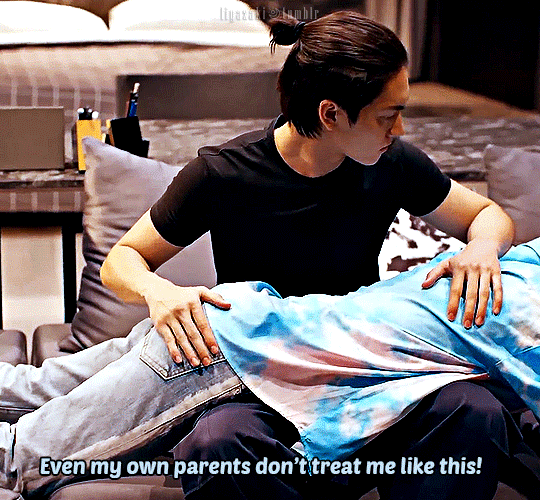
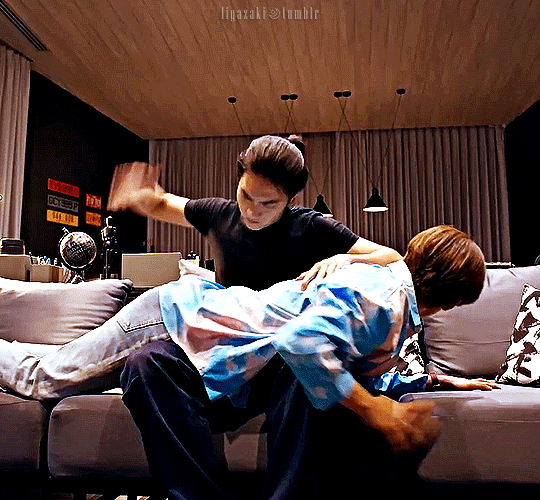
definitely not your parents. but your dadd- 🤐
love in the air | episode 2
#love in the air#love in the air the series#boss chaikamon#noeul nuttarat#phayurain#...what? like i *wasn't* going to gif this?#i see sp@nk*ng- i gif. i can't help you#also one doesn't just fall into that position rain#methinks the gentleman protest too much#edit: can’t believe i’m coming to the defense of a mame trash heap but y’all:#rain could’ve gotten out of this at ANY time#other scenes fit the dubcon bill but this ain’t one#phayu x rain#payurain#userpharawee#thai bl#bl drama#asiandramanet#asianlgbtqdramas#mor gifs love in the air
562 notes
·
View notes
Text
I swear ALASTOR WOULD LOOK SO FUCKING GOOD WITH HIS HAIR TIED UP
His ears, tail and ponytail are all i can think about
So have some doodles for Hazbin Hotel because the brain is rotting and I still have both hands and all my fingers to be able to obssess over this
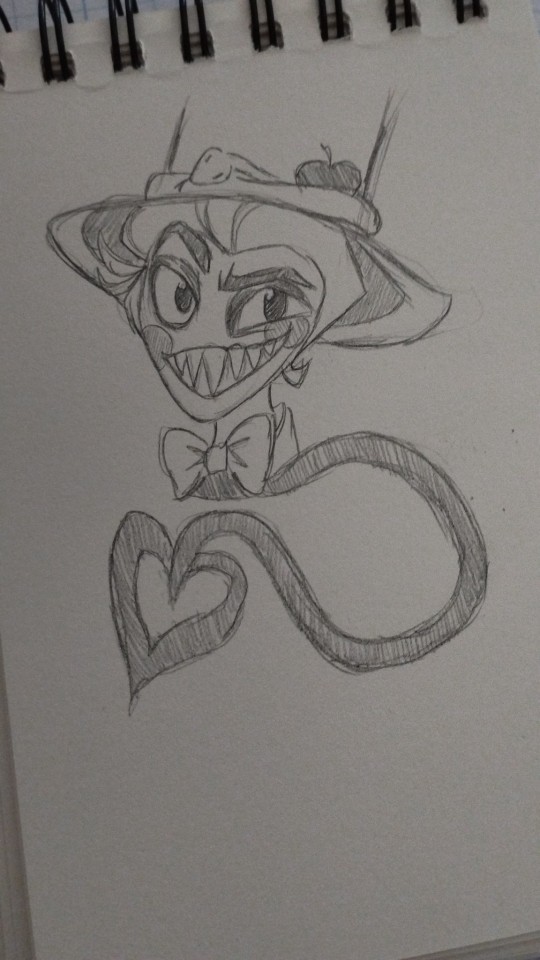


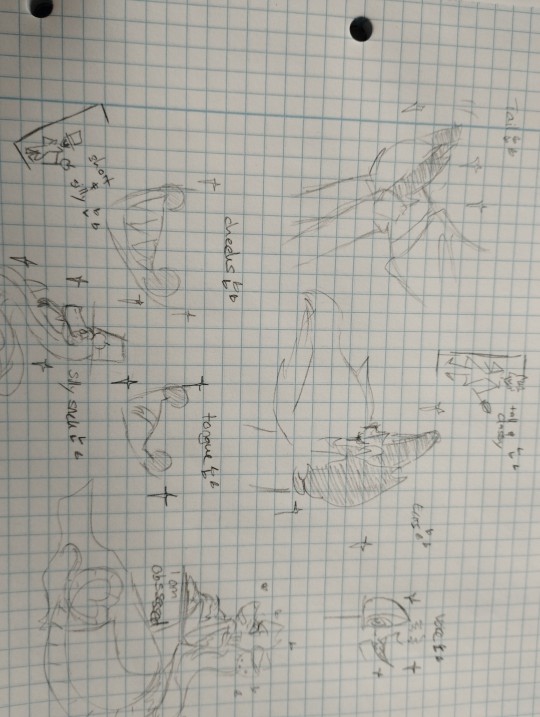
#alastor pony tail#hazbin hotel#alastor#just look at this!#omfggggg this is everythingggg#art#hazbin lucifer#hazbin alastor#lucifer magne#i just can't stop thinking about the silly big boss of hell and the gentleman radio demon#i love them so much#just look at themmmmmm#doodles#rough sketch#fanart
27 notes
·
View notes
Text
Episode 8 Queen of Tears BaekHong recap
Scene: Baek Hyun Woo’s universe has been Hong Hae In all along
The flashback to when Hyun Woo proposed to Hae In proves once again that Hyun Woo is a FOOL. That is his MBTI for sure. I’ll just combine this with episode 15 of this drama. At first I understand that it didn’t occur to him that it was all possible due to Hae In playing her chaebol card and renting all those places for them to date. But how is it possible that it never occurred to him after he knew that she is the heir to Queens Group? Making the connection is not that hard isn’t it? Anyhow… Hyun Woo really loves the universe in making decisions, doesn't he? He proposed to Hae In, believing that the universe is on their side and it is the sign for him to finally pop the question. He is such a simple and unassuming man. I’d just said it here, I really love this simple wedding band (yeah right, Bvlgari) from Hyun Woo instead of the other ring. I just loved it on her finger. Back to his universe, yeah, since Hae In was playing the universe all along, no wonder he never got the answer that he wanted for their divorce from the tiny leaves. No one is on his side in this world because his universe belongs to Hong Hae In entirely he will only realise it in episode 15.
I love the transition from their flashback to their current situation and again when Hae In remembered their memory from Germany and when she is back to reality once again. It was very beautifully crafted by the team. Back to the scene, Hyun Woo is hoping that this moment will last forever and Hae In will never remember their fight and his betrayal. But he would never allow that to happen no matter how bad the situation will turn out for him. He would rather face the consequences of his past self instead of being a more horrible human being to Hae In. He would rather she resented him instead of losing her to herself. Hae In finally able to remember the event in Germany and the harsh words that were uttered by Baek Hyun Woo and she was again traumatised by his words. She felt horrible that he’d seen her like this, in a situation where she is defeated by her illness and being cheated by herself and showing vulnerable emotion to Baek Hyun Woo, the man that despised her whom also the one made her life miserable. She finally makes up her mind…and they divorce.
Scene: In a day of Baek Hyun Woo
Hae In was reminiscing about the sunset they saw together when they were dating. We are already halfway through the series and all their dating flashbacks were heavy on Hae In being the only one exploring Hyun Woo’s life. She knows everything about Hyun Woo; his family, his hometown, his routine, his daily life but we never got anything about her while they were dating. It was obviously because he assumed that she was poor and even when she tried to explain it to him, he didn’t believe her. So, basically their relationship foundation prior to getting married was not strong. It was built based on assumption from Hyun Woo about Hae In, while she fully understands him and his lifestyle. So, their marriage is bound to find its own destruction anyway. Hyun Woo should’ve known and understood her family dynamic first before making the decision to marry her after she reveals that she is a chaebol. Instead, they got married right after because they were madly in love. While actually, he was at the beginning of knowing the “real” Hong Hae In. Hae In already has the data about him during their dating period but all the data about Hae In was new for him.
Hae In follows Hyun Woo’s steps because let’s be honest here… she fcking loves him and she misses her (ex) husband. She somehow started to really understand his life while they were married. She looked around and felt sad(?) that he was running alone while others were working out in pairs. When she overheard Hyun Woo and Yang Gi’s conversation, she felt guilty for being oblivious about Hyun Woo’s suffering throughout their marriage and somehow got her answer as to why he was always spending time alone. She also got to know that despite all that had happened, Hyun Woo still wanted to stay by her side.
I just love her dialogue to YES to put him at his place, to stop crossing the line, “I married (him) because I liked Baek Hyun Woo that said he’d be by my side, and I divorced him because I’m sorry for what he had to go through to be by my side.” The point is that she won’t just marry anyone because she needs to do it, she married Baek Hyun Woo because she liked him. Her husband will always be Baek Hyun Woo and no one else. She had never needed a man that can bring her more wealth because she is capable of doing it independently. She chose Hyun Woo because of his promise and above all because she loved him and still is. Despite Hyun Woo’s betrayal, it doesn’t change the fact that he is a good man which is something that YES can ever be.
Scene: Hae In to the rescue
Due to YES manipulation and Queens Family stupidity, Hyun Woo was being suspected as the whistle-blower and was denied access to the Queens Group intranet and building. My, my, my… there she is, his (ex) wife comes to his rescue. Who would believe that a divorced couple would protect each other like them? Who in their right mind would do that? Only them, Baek Hong couple supremacy! Anyway, it just occurred to me that this is actually the first time they talk to each other after the divorce. They seemed much more at ease after the divorce and silently doing their best to protect each other (fools!! Fools in love!) But, Hae In is angry and frustrated at Hyun Woo who was humiliated while he just silently enduring it. She was then perplexed by his response, “I’m doing this because I want to do it and still stay here where I wanted to”. Even in the middle of this, he still worried for her health. He will be ok as long as her condition is fine. See, this is why Hyun Woo is a good man. We knew it and even Hae In knew that he wanted to be by her side, but he never does anything to persuade her to accept him again. He is just there, waiting patiently and understanding her. A gentleman that respects her decision and silently protecting her.
Summary:
Like what he promised her in Germany, he will follow whatever decision she makes for their marriage and so far he is keeping it, much to our frustration of course. He accepted her decision to divorce, following her direction regarding the divorce settlement and respecting her space while still protecting her. He never made any effort to defend himself or make excuses to her, for he truly felt remorseful for his action. He only hopes for Hae In to continue her treatment and regain her health. His love for her is selfless. In the meantime,
Hae In wanted to live…
She also wanted to stay by his side… they wanted the same thing but what is stopping them? We knew that Hyun Woo is not gonna make a move until he knows that Hae In has really given him the forgiveness. The key is on Hae In but she knows her condition is not improving currently. Being together will only make them suffer and she doesn’t want that, especially for Hyun Woo I think. They just need some time to think and realise that they actually don’t have much time together to be wasting it by not being together.
#queen of tears#baekhong#rewatching#is this divorce couple#gentleman hyun woo#hae in protects hyun woo#hyun woo universe is hae in#lady boss hong hae in
9 notes
·
View notes
Text

#a gentleman’s guide to love and murder#same energy as 'Owl in a Cage'#angst#bryce pinkham (main series)#gay#stolas of the ars goetia#stolitz#'what if' meme#crossover 😈#helluva boss#blitz buckzo#sad but true#pansexual#lament#musicals#Spotify
31 notes
·
View notes
Note
Hi Can you do Fell papyrus Fluff and romance(cause its cute)
Ofc you can darling! You've been waiting a while for this one so I apologize 🙇♀️🙇♀️ I hope you don't mind if it's headcannons instead of a fic👀👀
(If you'd prefer a fic please let me know via my ask box😊)
~~~~~~~~~~~~~~~~~~~
❤Romantic Boss headcannons❤
He absolutely spoils you with love and affection when he's alone with you, like he'll be tough around others but as soon as your alone he's like a little kitten wanting attention
He adores it when you two just slow dance in the kitchen it makes him feel all fuzzy inside
His favorite cuddle position is with you cuddled up facing him with his arms around you lower waist and your legs intertwined with his
He cooks for you, obviously he loves surprising you with your favorite meals when you come home deadass this mf studies the food you like just to see you smile and enjoy his cooking
He's extremely overprotective of you like he's not a fan of a public display of affection but he'll definitely give any shitbag a death stare who even glances the slightest bit wrong at you
Although he doesn't let it show he absolutely loves it when you interrupt his work by sitting on his lap and cuddling him, don't let his harsh words get to you! He loves it!
Trust me if you wanna see him stutter, blush, fall over his words & make him look like a lovesick fool call him "Bubs" or "Hubby" and or "Bubba" he is weak when you call him these
Is a helpless romantic although he may protest he'll definitely watch the Beauty and the Beast with you and dance with you to Tale as old Time
He has expensive taste when it comes to Dates especially anniversaries and birthdays he will take you to extravagant diners and restaurants, expect nothing less from the leader of the Royal Guard
He let's himself be weak around you and you fall more and more in love with him as he falls more and more in love with you
Yes, yes he will buy matching dinosaur pajamas with you (just don't let the others know-)
~~~~~~~~~~~~~~~~~~~
Here you go darling again I'm so sorry for the long wait🙇♀️🙇♀️
Please enjoy these headcannons❤❤
#undertalefics#husbones#ut au#headcanon#underfell#underfell papyrus#underfell papyrus x reader#underfell x reader#Boss#boss x reader#boss is such a gentleman istg
210 notes
·
View notes
Text
So you've got to write a sympathy card for your boss's dog. Or comment on a post announcing the death of your distant uncle. Or go to your partner's grandmother's funeral. But what do you even say to the people left in the wake of tragedy?
Please consider, my personal* list of dos and don'ts for expressing your condolences to the grieving.
Do... Think of your favorite memories of that person. Even something small like what they often wore.
Example: "The cake they baked for the charity auction was one of the best bundt cakes I've ever had."
Example: "When I think of [passed person], I remember how they always had fun sweaters to wear on Christmas."
Intended effect: Grief is a grey cloud that surrounds the mind and blocks out light. Reminding the person grieving of something specific and positive associated with the deceased helps them remember it too. It also gives them comfort that that person, who is physically gone from the world, is not gone from everyone's minds or hearts.
Do... Consider how they passed, the relationship to the person you're consoling, and how that person you're consoling has talked about them/their death.
Example (the relationship was fraught): "This must be a difficult time for you. I am wishing for you lots of rest and peace of mind."
Example (the deceased passed from a long, difficult illness): "Though they will be terribly missed, I'm glad to know they are finally at peace."
Intended effect: Considering the context of how the person passed and how the griever feels about it will make them feel like you aren't just saying words you've heard before to make yourself comfortable. A common phrase that may work well in one situation may work terribly in another.
Do... Question your own feelings about the death. What was your relationship to the deceased? Do you also feel sad for this person's passing? Or do you just want to provide comfort for the grieving person?
Example (you are affected by the death): "I wish I could give them one last hug, but I'm so glad to have known them for as long as I did."
Example (you didn't know the deceased well but you knew them casually): "I was so sorry to hear of their passing. I hope you are doing well and taking care of yourself."
Example (you never met the deceased): "I am sorry for your loss, I am thinking of you and your family."
Intended effect: People who are grieving can feel incredibly alone in their grief, especially if the loss was great. If you are also affected by the death, by all means express it (sensitively), because the griever will feel less isolated in their feelings. Even if you yourself are not affected, you can still lessen their isolation by expressing care towards the griever.
Do... Let silence speak for you. If the griever is a hugger, a few words and a long hug may do more good than 1,000 words ever could.
Don't... Bring up religion or an afterlife if you do not know what the person grieving believes, or they know you do not believe it yourself. "I'm praying for you" may be appropriate for some, but "I'm thinking of you" is a safer bet.
Don't... Say phrases like "everything happens for a reason" or "God has a plan for us all" unless the griever has already expressed this attitude around this specific death.
Don't... Say platitudes you don't mean or that are insincere to a point where it would be obvious. For example, do not say "they were a light to us all" if you spoke to the deceased maybe twice, or they were a chronic grump.
Don't... Assume that the person who is grieving doesn't feel anything negative or complicated about the deceased, unless you are extremely close with the griever. Even someone you know on a basic level may not confide in you their negative feelings about the person who passed, especially if they were a close relative. If you are unsure about the nature of the relationship, focus on the griever and express care towards them rather than sorrow for the loss itself.
Don't... Try to fix or solve anything. Be present, be warm, be understanding, and you will do just enough to maybe ease some small fraction of the pain.
Don't... Be 100% positive. It's tempting to try and cheer someone up by not dwelling on anything bad or uncomfortable, but that's more isolating than anything else. It also signals to the griever that you yourself are uncomfortable, which isn't incredibly helpful.
Don't... Be 100% morose. The person grieving may crack a joke, and it may be a dark one, but just go with it and laugh along. The ridiculous is made even moreso in the context of tragedy, and the person grieving will always appreciate/remember any points of levity they had in an otherwise dark time.
Don't... Be afraid to say anything at all, even if it's unoriginal. A simple "I'm thinking of you" is better than silence.
*I approached this topic from the headspace of someone grieving a complicated but profound loss, years after the fact. Trying to remember how it felt to be freshly grieving myself, I tried to be truthful but not too specific. If you have any other tips as someone who is familiar with grief, feel free to add. If you disagree with my list, then we simply process grief differently and I encourage you to make your own post. Thanks for reading 💚
#grief#loss#no not the meme#long post#the first thing isn't a joke i made this post after trying to think of what to write in a sympathy card to my boss after losing her dog#rip odin the boxer. he used to sit on their couch upright like a little gentleman and watch the people pass by the window.
7 notes
·
View notes
Text
My new boss just bet that he could do 15 wall balls in 20 seconds and on his first rep he blew the ass end of his jean shorts out.
If that’s not Hangman energy idk what is.
16 notes
·
View notes

